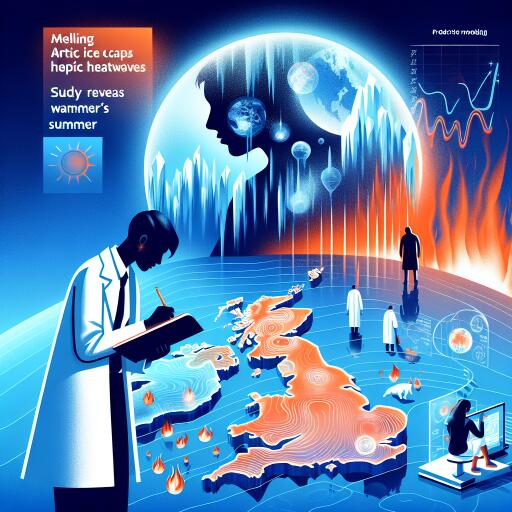
Melting Arctic Ice Caps Linked to Predicting UK Heatwaves, Says New Study
Intense summer heatwaves in the UK might have a surprising connection to the distant, ice-covered regions of the Arctic, unveils a groundbreaking study. As the planet warms, melting ice caps could spell more severe weather phenomena, yet also hold the key to forecasting them well in advance.
The research, spearheaded by Dr. Marliena Oltmanns at the National Oceanography Centre in Southampton, presents an optimistic outlook on predicting northern Europe’s summer climate. “By analyzing data from the previous winter, we can better predict the occurrence of warm and dry summers in northern Europe,” Dr. Oltmanns explains. This predictive capability could prove invaluable, offering crucial lead time for sectors like agriculture, healthcare, and energy to prepare for the adverse impacts of heatwaves.
The intriguing connection between the Arctic’s summer melt and northern European weather extremes has long been suspected by scientists, but the specifics remained unclear until now. This latest study delves into how the massive volumes of cold, fresh meltwater from the ice caps influence the North Atlantic current and ultimately the positioning of the jet stream in the atmosphere.
During the summer months, the influx of meltwater can disrupt the typical flow of warm tropical waters, impacting the atmospheric weather systems above. This disruption can cause the jet stream to ‘kink,’ leading to the stagnation of high pressure and hot air over the UK, a primary factor behind the heatwaves.
The research draws upon recent episodes, such as the unprecedented UK heatwave in 2022, where temperatures soared above 40C, leading to significant health crises. This study offers a new perspective, challenging the widespread concern over a potential “shutdown” of the North Atlantic’s ocean currents, which some fear could lead to prolonged cold spells in the UK. Dr. Oltmanns argues that the immediate influence of ocean temperatures on the jet stream is a more significant factor in shaping weather patterns than the slower-moving currents.
“The origin and direction of wind patterns hold the most significant implications for our climate and societal impacts,” she notes, emphasizing the importance of understanding these dynamics.
What implications does this research have for the UK’s weather forecast in the upcoming summer? According to Dr. Oltmanns, the likelihood of experiencing an extreme heatwave akin to previous years is reduced due to an ongoing ocean heatwave in 2023. This suggests a less dramatic shift in the jet stream, potentially sparing the UK from the most severe heat conditions.
However, the current climate dynamics suggest that southern Europe may not be as fortunate, with increased chances of facing intense heat and associated challenges like wildfires and droughts. This insight into the interconnectedness of climate phenomena underscores the far-reaching implications of Arctic melt far beyond its immediate geographical area.
The findings not only highlight the importance of ongoing climate research but also offer a glimmer of hope in our ability to anticipate and mitigate the impacts of climate change. While the direct correlation between melting Arctic ice and UK weather patterns opens new avenues for prediction and preparedness, it also serves as a stark reminder of the urgent need for global environmental stewardship.





Leave a Reply